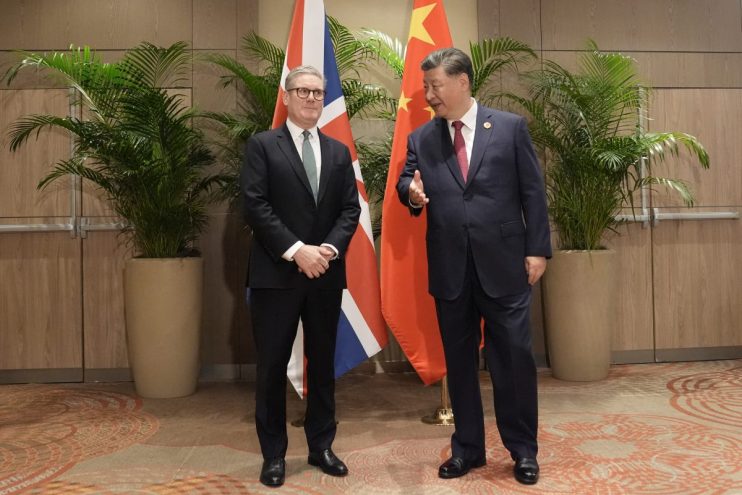Labour’s China ‘audit’ is pointless. We already know Starmer’s stance on Beijing

Labour has clearly settled on its stance towards China, let’s give up the “audit” nonsense, writes Eliot Wilson
The chancellor of the Exchequer, Rachel Reeves, will visit China this month. She will visit Beijing and Shanghai, accompanied by the City minister Tulip Siddiq and a substantial delegation, the business element of which will be led by the chairman of HSBC Sir Mark Tucker. Reeves will meet the Chinese vice-premier He Lifeng, becoming the first UK minister to hold formal economic talks with the People’s Republic since Philip Hammond in 2019.
Wait, you cry! Is not one of the Labour government’s 50+ policy reviews and working groups an “audit” of UK/China relations, promised in the party’s election manifesto? You would be correct. Labour made a point of criticising “14 years of damaging Conservative inconsistency over China”, and instead pledged greater depth of thought and clarity of purpose.
“Labour will bring a long-term and strategic approach to managing our relations… we will improve the UK’s capability to understand and respond to the challenges and opportunities China poses through an audit of our bilateral relationship. We will always act in our interests and defend our sovereignty and our democratic values,” the manifesto reads.
The “audit” began in August and it was anticipated that its conclusions would be published this month at the latest. Now, however, Whitehall sources have let it be known that the work is on hold until after Reeves’s visit. Instead it will be published “in the spring” and only some of its findings will be made public. As a former parliamentary official, I can tell you that when the government says “in the spring”, wise heads ask “the spring of which year?”.
What is the purpose of the “audit” now? By the time it is published, even partially, the foreign secretary and the Chancellor will both have visited Beijing. Meanwhile the Prime Minister already held talks with President Xi Jinping on the margins of the G20 summit in Rio de Janeiro in November and the energy security secretary, Ed Miliband, is expected to visit China in the coming months.
Sir Keir Starmer seems already to have decided that engagement with the Chinese government is a firm part of his agenda. If the audit were to conclude that His Majesty’s Government should exercise greater caution and circumspection in dealing with Beijing, it would entail a handbrake turn of a scale and suddenness which would shame the Fast and Furious film franchise. If it instead endorses the decision to pursue active and wide-ranging positive relations, it endorses after a choice effectively made in the autumn of 2024.
That choice was not an inevitable one. China continues to suppress pro-democracy protesters in the former British colony of Hong Kong with an extremely heavy hand, including the ongoing imprisonment in solitary confinement of the 77-year-old British national Jimmy Lai, the businessman and publisher who faces charges of conspiracy to collude with foreign forces. Beijing has effectively repudiated the Sino-British Joint Declaration, the 1984 agreement which provided for the transfer of Hong Kong from British jurisdiction to a special administrative region of China.
In addition, several espionage operations by China against the UK have been exposed in recent years. In April last year, a parliamentary researcher was charged under the Official Secrets Act with providing information to the Chinese government, and it was recently revealed that a man barred from the UK as a national security risk by the Home Office in 2023 was Yang Tengbo, who had cultivated a relationship with Prince Andrew and met David Cameron, Theresa May and George Osborne.
There has been an exhausting and pointlessly pedantic debate over how we should classify China: competitor, opponent, adversary, enemy? But this becomes much more concrete with regard to the Foreign Influence Registration Scheme which is designed to regulate those who advocate for foreign powers. The government has already delayed the scheme’s introduction and is silent on whether China will eventually be placed in its “enhanced” tier, as the previous Conservative government had planned.
It looks very much like the government has ducked a difficult decision and decided that the economic opportunities available through cordial relations with China are irresistible, whatever the cost. But it will not say that explicitly or honestly; instead we must endure the solemn faces and portentous words of Starmer, Reeves and Lammy on “tough choices” and “standing up for our values”, which represent poorly applied lipstick on the aggressive pig of realpolitik.
International relations are hard and always entail compromises that can unsettle the stomach and the conscience. The China “audit” is pointless now and might as well be halted completely because the government has clearly settled on its stance towards Beijing. What is galling is the straightforward economic necessity presented as high-minded principle and considered thought. Many observers will feel that they have had enough.
Eliot Wilson is a writer and strategic adviser
